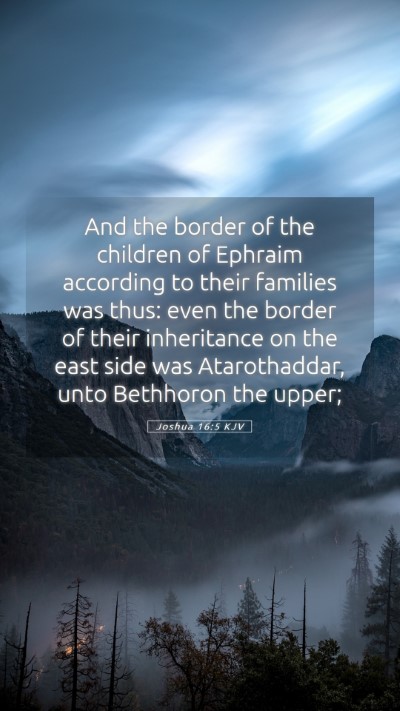Old Testament
Genesis Exodus Leviticus Numbers Deuteronomy Joshua Judges Ruth 1 Samuel 2 Samuel 1 Kings 2 Kings 1 Chronicles 2 Chronicles Ezra Nehemiah Esther Job Psalms Proverbs Ecclesiastes Song of Solomon Isaiah Jeremiah Lamentations Ezekiel Daniel Hosea Joel Amos Obadiah Jonah Micah Nahum Habakkuk Zephaniah Haggai Zechariah MalachiJoshua 16:5 Meaning
What is the meaning of Joshua 16:5?
And the border of the children of Ephraim according to their families was thus: even the border of their inheritance on the east side was Atarothaddar, unto Bethhoron the upper;
Joshua 16:5 Bible Verse Meaning
Understanding Joshua 16:5
The verse Joshua 16:5 states: "And the border of the children of Ephraim according to their families was thus: the border of their inheritance on the east side was Ataroth-addar, unto Beth-horon the upper." This verse is part of the narrative concerning the allotment of the land to the tribes of Israel following their conquest of Canaan. It provides both geographical and territorial details regarding the inheritance of the tribe of Ephraim.
Significance of the Verse
In understanding the meaning of Bible verses, especially in contexts like Joshua 16:5, it is crucial to consider the historical and geographical aspects. The land distribution signifies God's faithfulness to His promises, as seen throughout the historical accounts of Israel’s journey to the Promised Land. Below are some insights compiled from notable public domain commentaries.
Commentary Insights
-
Matthew Henry:
Henry emphasizes that the borders described are not merely administrative but carry deep significance in the legacy of Israel. The land given to Ephraim symbolized the continuation of God's covenant and His provision for the tribes. He notes that the geographical outlines help future generations understand their inheritance.
-
Albert Barnes:
Barnes elaborates on the boundaries listed in the verse, indicating that they delineate Ephraim’s territory in a specific geographical context, showing how God directed the distribution of land. He points out the importance of recognizing these borders, as they reflect the structure of society and governance among the Israelites.
-
Adam Clarke:
Clarke highlights that Ataroth-addar and Beth-horon represent significant locations for Ephraim. The mention of cities and geographical features serves not just as a record but also signifies God’s careful planning and fulfillment of His promises to the tribes of Israel. In this light, understanding Scripture involves recognizing God's guidance in the settlement process.
Biblical Exegesis and Modern Application
When engaging in Bible study insights, particularly in passages like Joshua 16:5, readers can apply the principles of faithfulness and divine order to their lives. The marking of boundaries can remind believers today of God's sovereignty and structured plan for His people, leading to reflections on personal boundaries, spiritual inheritance, and community relationships.
Applying Joshua 16:5 to Daily Life
Understanding difficult Bible passages like this one encourages us to seek God’s word actively. Modern believers can find encouragement in the faithfulness of God, similar to how the Israelites experienced His provision. This verse teaches that each believer has a unique inheritance—a calling and purpose designed by God.
Cross References
Joshua 16:5 is deeply interconnected with several other passages that enrich its interpretation:
- Joshua 14:4 - The significance of the Levites' specific inheritance.
- Joshua 18:5 - Other tribes receive their land shares, showing the collective heritage.
- 1 Chronicles 7:20-27 - Descendants of Ephraim and their legacy.
Concluding Thoughts
In summary, Joshua 16:5 serves as both a historical record and a spiritual lesson. Insights from commentary and modern application can turn a merely informational verse into one rich with meaning. For those involved in Bible study groups or seeking online Bible study resources, this verse highlights the importance of recognizing God’s faithfulness in both the past and present.
Further Exploration
To enhance your understanding of Scripture, consider exploring more about:
- How to interpret Bible verses: Set a framework for studying.
- Historical context of Bible verses: Analyzing surrounding culture and time.
- Meaning of parables in the Bible: Deepening insight into Jesus' teachings.


